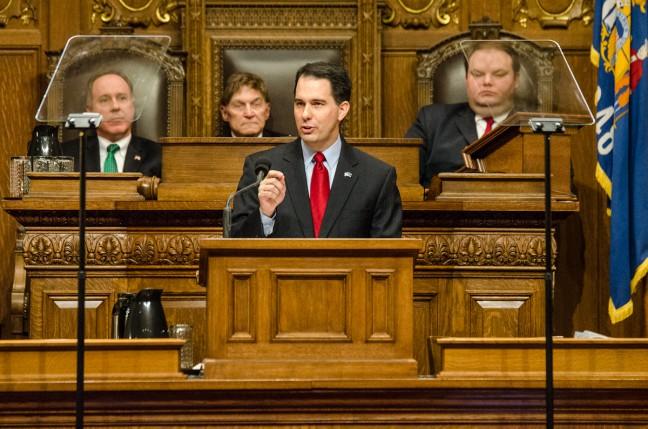Gov. Scott Walker laid out his plan to redistribute wealth to the taxpayers in his State of the State address Wednesday night, amid news of the lowest unemployment levels in Wisconsin since the Great Recession and the discovery of more than $900 million surplus.
Walker announced his framework for continued reform in the state, which he calls his “Blueprint for Success.” The plan includes a round of property and income tax cuts, as well as investment in education, transportation and job training within the private sector.
“The best way to prepare for the future is by continuing to grow our economy, not by keeping more money in Madison,” Walker said. “With a rainy day fund seven times larger than we’ve ever had before I took office, now is the time to send your money back to you, the hard working taxpayers of Wisconsin.”
Some taxpayers joined Walker on the stage as representatives of employed residents across the state: Joann Stephens, a quality engineer from Appleton, Heyward Gualandi, a sales supervisor from Madison and Ben Lang, a design engineer from Brookfield, among others.
Walker said the creation of 100,000 jobs and close to 13,000 new businesses in the past three years is one of the main reasons for the positive revenue the state is experiencing.
“As a candidate for Governor, I announced an aggressive jobs goal because I want people like Joann and Heyward and Patti and Rick to be able to find work,” he said. “Every time we help someone find a job, it makes for a stronger home, a stronger community and a stronger state.”
Following Walker’s closing remarks, Rep. Peter Barca (D-Kenosha), gave an official statement in response to Walker’s address on behalf of the Democratic Party.
Despite Walker’s claims of substantial job growth during his three years in office, Barca said Wisconsin has fallen from 11th to 37th in terms of job creation in the US.
“It’s hard for me to imagine that he wants to go back to structural deficits,” Barca said. “In a time of surplus, that’s a self-inflicted injury.”
The governor said another factor to ensuring economic growth in the state is prudent fiscal management and saving for investment.
In addition to achieving a surplus, Walker said the state has repaid loans to the state of Minnesota, restored funding for transportation and accumulated an emergency fund that is 165 times larger than when he took office.
“We are turning things around,” Walker said. “We are heading in the right direction. We are moving Wisconsin forward.”
Developing skills-based education in areas such as health care, information technology and advanced manufacturing will be another focus of investment for the administration, Walker said.
The governor said his administration has already done this through collaboration with the UW system, citing the creation of the University of Wisconsin Flexible Option program and the funding of new positions at the Medical College of Wisconsin as examples.
“Every child, regardless of where they live or what their parents do for a living deserves a chance to have a great education,” Walker said.
Barca said Walker neglected to mention the many issues that Wisconsin still faces. He said although the state has a surplus, most states do by now.
He added that much of the money within the surplus came from major cuts to public education, cuts to job training at technical colleges and tax hikes on lower-income families.
“The nation is recovering and most states have surpluses. That’s good news for America, but Wisconsin lags behind in job creation and economic recovery,” Barca said. “That is tragic in a state that is accustomed to leading the nation.”
Nyal Mueenuddin contributed to this article.













